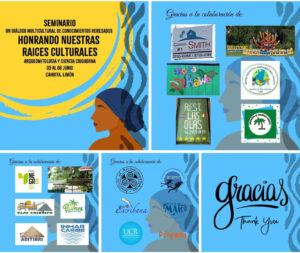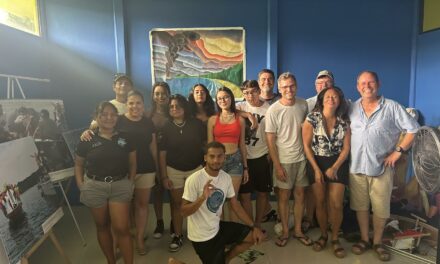María Suárez Toro, on behalf of the Organizing Committee.
The Seminar was organized by the Ambassadors of the Sea Community Diving Center, the Institute of Citizen Sciences of the Sea (INMAR CARIBE), the Festival of the Sea, University of Costa Rica (UCR), and the International Institute of Archaeomythology, held on June 3-6, 2024, in Cahuita, Talamanca, Limón, Costa Rica.
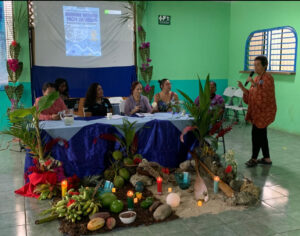
It encouraged rich dialogues about our traditional lifeways in Talamanca and other national and international cultural regions, focusing on ancestral and current cultural expressions of life through the experiences of women and their communities in their contexts.
The Seminar developed panels, presentations, dialogues, debates, rituals, storytelling, poetry, music, arts, and field visits to Winston Mac Cloud’s Afro Cacao Farm production and a tour by Ambassadors of the Sea, Maraya Jimenez and Pete Stephens, to Ambassadors of the Expo and the Community Collection of Underwater Archaeological Artifacts.
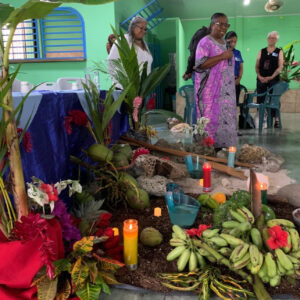
The activities developed experiences, approaches, and conceptualizations related to archaeomythology by exploring ancestral sources of knowledge. In Talamanca, this process is called “citizen science” because it connects scientific knowledge with ancestral knowledge when communities participate fully in these processes.
Ambassadors of the Sea presented their practice of integrating all forms of knowledge, which Afro and mixed Bribri/Afro youths have applied in their community cultural stewardship project. This process has been capable of finding and verifying a hidden history at the bottom of the sea, linking it to present-day struggles to affirm the tribality of Afro and mixed heritage populations and peoples.
This recovered history was connected in the Seminar proceedings with the local Bribri, Cabécar, and Ngäbe, and regional Abya Yala ancestral native roots expressed in relation to the waters and the sea, and the myths, and current struggles of the tribal Afro-descendant population to affirm their identities, connections to the sea, and their history of shared resistance to colonization.
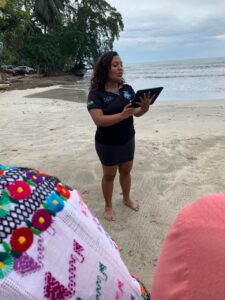
The waters of the ocean as a living being that holds the memory, the lost history and the sacredness of life affirms the connection between the tribal Afro descendant women and the indigenous women of Talamanca and elsewhere in this Seminar, in the voices of Ngäbe Thalia Jimenez and Eulalia Thomas who called for possibilities to help them teach their children to swim so that they can learn the relation to the ocean; of Bribri Laily Larrain Moren, Dulcelina Sanchez, Kaila Pizarro, Jeny Loaiza y Luisa Mayorga developed their connection to the sea and all waters committing to ask the elders in their communities to expand their knowledge about it with further stories and myths. Also, the presenter with them was Guadalupe Urbina, affirming the connection of their foundational stories of the creation of the ocean of Bribri and Cabecar “Mulurtmi”, with those of original communities in the rest of Latin America. “The ocean belongs to all of us,” they agreed.
Tribal Afro descendant Hellen Simmons, in Cahuita, head of the Secretariat for Afro Affairs in her community, and representative of the Universal Negro Improvement Association (UNIA) in Costa Rica, presented a recognition of the work by Ambassadors of the Sea. “The youth divers have brought back the thread that connects us all….” She highlighted that there is now a need to work together with all expressions of tribalism in the country, Afro and indigenous, to potentiate the findings into reparations. “It is my job to contribute to this, so that we guarantee that the history that my children will learn is our history.”
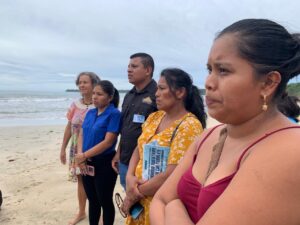
Afro-descendant member of the Cahuita Association of Development (ADIC), Laura Wilson, presented her “Anancy” ancestral story in Creole and called for an alliance between the Afro-descendant women and their tribal communities, the Bribri and Cabecar women and their tribal communities, based on their common history and shared experiences in Talamanca.
Joan Marler, a member of the USA delegation and director of the Institute of Archaeomythology, introduced the Lithuanian North American archaeologist Marija Gimbutas (1921-1994), who coined the interdisciplinary methodology of archaemythology. Her purpose was to establish a way to investigate the beliefs, symbols, mythos, and social structures of early societies. She also identified “Old Europe” (7th to 4th mill BCE) as the earliest non-patriarchal civilization in Europe in which women, and the entire living world, were honored at the center of culture. The use of archaeomythology with citizen science has encouraged underwater researchers in Cahuita to recognize the significance of their ancestral knowledge, expressed over many generations through foundational stories, ancient artifacts, rituals, and beliefs. This understanding makes it possible to interpret their findings in new ways and rediscover their roots.
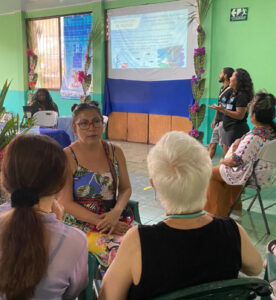
Vicki Noble, also a member of the Institute of Archaeomythology, explained that matriarchal societal relations originated in the earliest hominid societies in Africa, based on the relationship between the moon and women as central figures in societal relations. “It means that this relationship in the rest of the world is a contribution that came from Africa”.
Other presentations included Tara Roberts, an African descendant diver and communicator, Resident Expeditionary of National Geographic, who is designing a project to create a “Ship of Return to Africa”, a year-and-a-half trip collecting stories in ports in the Americas and ports in Africa related to the Transatlantic Slave Trade. “By boat, we will follow the route of the Portuguese, starting in Europe and going to the Caribbean, then continental Atlantic then to West Africa, to bring back the memories but also (in relation to this Seminar) is to collect stories of people who have not been heard about the slave trade and will also do artistic installations underwater, in memory and so that divers can visit them. “I was moved by the divers project in Cahuita in 2019 because it was the local divers, the ones who were driving the new history and the search themselves, whereas in the other places the work came from outsiders coming in, and that is the story that I do because my job is to amplify the stories.”

Anabelle Contreras, a philosopher from the National University of Heredia in Costa Rica, presented her view that the 500 years of experience in Talamanca demonstrate there is no need to decolonize this region, as it has not been colonized. “Here there is a live knowledge, resistant, that does not need rescue, but rather to be maintained; here people have their grandparents as their “encyclopedia” of knowledge, and it challenges the predominance of the scientific method as the only or best. Ambassadors defy that by building knowledge based on an inclusion of ancestral knowledge”, she concluded.
Artistic presentations of poetry (Karina Obando and Yolanda Bertozzi and Macarena Barahona (with a video in absence), singing (Guadalupe Urbina) and storytelling (by Maraya Jimenez, Toluwamini Obuwole, Laura Wilson and Laily Larrain), further enriched the program in a night of poetry and music in Coco´s and an everyday portrait drawing sessions by Sorrel Mocchia di Coggiola – artist in the delegation of the Institute of Archaeomythology – who drew portraits of many of the participants, explaining that “the memory of those Africans that died during the slave voyage that ended up in Cahuita are in the faces of the people of the community today”.
A fantastic team of communicators for dissemination in social media (Ivi Rodriguez and Tsyru), mainstream media (Maria Suarez Toro), documentation of the event (Joan Marler), technical work for presentations (Toluwanimi Obiwole), and in situ translation (Luisa Salguero) facilitated the process of sharing the wealth of the proceedings. Over 50 features in video, pictures, articles, and recordings have already been disseminated, and the whole proceedings were recorded towards a Memoria that may become a book.
Another team of supporters in food and drinks, like coconut water and traditional Calalu (African spinach). The decoration of the communal center where the event took place, along with the attention to logistics, was the collaboration of Leda Villa and Javiera Aravena of INMAR Caribe, Gaby Salguero, and Pablo.
The Seminar was financially feasible due to the shared gift-giving relationship (Mano Vuelta) among all participants, covering their travel expenses from abroad, from other parts of the country, and from the highlands of Talamanca to Cahuita. Also the contribution of INMAR Caribe through its rental of Casa Marina for three months to have resources, two monetary donations from women in the USA, a contribution by the University of Costa Rica in food and publicity, and the solidarity expressed in reduction of prices for their services by many local businesses like: Restaurant Las Olas, Coral Reef, Super Negro, Cabinas Smith, Cabinas Palmer, Soda Kawe, the Cahuita Development Association (ADIC), the Bribri Development Association (ADITIBRI) and Centro Comunitario de Buceo Ambassadors of the Sea.
All of those interactive contributions expressed and expanded collective and diverse cultural knowledge, which is relevant to the deepening expressions of pluriculturality and multiethnicity in the Talamanca region, as recognized in the Constitution of Costa Rica of 2014.
It has also expanded the regional and international connections of our local experience with others and with each other.
These ties promote a deeper recognition of our shared heritage, expressed through multicultural knowledge and the honoring of ancestral roots. These roots are preserved in various ways by traditional tribal societies in Costa Rica and across Latin America and the Caribbean, interacting with other such experiences.
The forward-looking action proposals of the Seminar include the following:
Organizing an Oral History Festival in Talamanca, where ancestrality can be honored and connected to present-day struggles.
Undertake what is required in Costa Rica to ensure that our local experience becomes part of the Nat Geo Boat Project.
Welcome the proposal by the Archaeomythology Institute to publish a Special issue of its journal on our citizen science and community archaeomythology in Talamanca, inviting presenters and others to contribute articles for this special publication.
Another proposal accepted by the plenary session was to promote the indigenous women of Talamanca at the first Indigenous Women Conference in China Kichá in the Pacific in August of this year.
Another request is for participants in INMAR Caribe and the Diving Center to teach their children to swim, so they can learn to respect and honor the sea.
Meet the organizers:
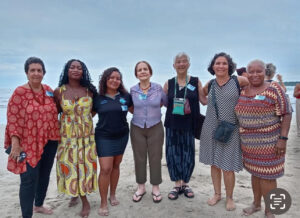
For more information: [email protected]
Sponsors:
